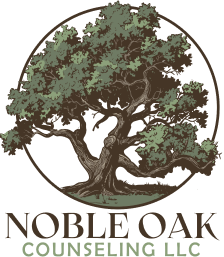Attachment theory is a powerful framework in counseling and therapy, shedding light on how our early childhood experiences influence our emotional and relational lives as adults. At Noble Oak Counseling, we use attachment theory to help clients understand the roots of their behaviors, stress responses, and relationship patterns. By exploring attachment styles, individuals can gain valuable insights into their emotional world and develop healthier ways of connecting with others.
What Is Attachment Theory?
Attachment theory, developed by John Bowlby and later expanded by Mary Ainsworth, is centered on the bonds we form with our primary caregivers in early childhood. These early relationships shape how we view ourselves, others, and the world around us. Our caregivers’ responses to our needs teach us how to manage stress, form connections, and regulate emotions.
When caregivers respond consistently and sensitively, children are likely to develop a secure attachment style. However, if caregivers are inconsistent, neglectful, or unpredictable, children may develop insecure attachment styles. These patterns often persist into adulthood, influencing how we relate to others, cope with stress, and manage our emotions.
Why Is Attachment Theory Important in Counseling?
Attachment theory provides a foundation for understanding and healing emotional wounds that may have been formed in childhood. At Noble Oak Counseling, I use attachment theory to help clients recognize the connections between their past experiences and their current struggles. By identifying their attachment style, clients can gain clarity about why they react a certain way in relationships or why they may struggle with intimacy, trust, or managing stress.
Through this understanding, clients can work toward forming healthier, more secure attachments in their current relationships. Attachment-based counseling offers practical tools for building self-awareness, developing healthier coping mechanisms, and improving emotional regulation.
The Four Primary Attachment Styles
Let’s explore the four main attachment styles and how they influence adult behavior:
- Secure Attachment
Individuals with a secure attachment style typically had caregivers who were consistent, responsive, and emotionally available. As a result, they learned that they could rely on others to meet their needs, which allowed them to develop a strong sense of trust and self-worth.
In adulthood, those with a secure attachment style tend to:
- Form healthy, trusting relationships
- Feel comfortable with intimacy and emotional expression
- Navigate conflicts and stress effectively
Counseling can help individuals strengthen or achieve a secure attachment, even if they experienced challenges in early life. The therapeutic relationship itself can become a safe space for developing trust and security.
- Insecure Avoidant Attachment
Those with an insecure avoidant attachment style often had caregivers who were emotionally distant or unresponsive. These children learned to become self-reliant, suppressing their emotional needs to avoid rejection.
As adults, individuals with avoidant attachment may:
- Struggle with intimacy and closeness, preferring independence
- Avoid emotional vulnerability, fearing that it may lead to rejection or disappointment
- Find it challenging to rely on others or ask for help
While these strategies may have helped them cope as children, they can lead to difficulties in forming close, fulfilling relationships as adults. Therapy can help individuals recognize these patterns and build skills for healthy, open connections.
- Insecure Ambivalent (Anxious) Attachment
Individuals with an insecure ambivalent (or anxious) attachment style often had inconsistent caregivers—sometimes responsive, other times unavailable. This inconsistency led children to become uncertain about whether their needs would be met, causing them to cling to caregivers in hopes of receiving attention and support.
As adults, people with this attachment style may:
- Feel anxious in relationships, fearing abandonment or rejection
- Seek constant reassurance and validation from partners
- Experience intense emotions and difficulty managing stress
Counseling can help these individuals build a sense of security, work through fears of abandonment, and develop more effective ways of managing their emotions and relationships.
- Disorganized Attachment
A disorganized attachment style often results from chaotic or traumatic early experiences, such as abuse or inconsistent caregiving. These children may feel a sense of fear or confusion in their relationship with their caregiver, leading to unpredictable and conflicting behaviors.
In adulthood, disorganized attachment can manifest as:
- Difficulty regulating emotions and behaviors
- Fear of both closeness and abandonment, leading to unstable relationships
- Patterns of intense, conflicting feelings in relationships
Therapy is crucial for individuals with disorganized attachment, as it provides a safe and structured space to explore and heal from past trauma. At Noble Oak Counseling, I work with clients to develop healthier ways of coping, regulate emotions, and build stable, secure relationships.
How Understanding Attachment Styles Can Lead to Growth
Understanding your attachment style can be transformative. It allows you to see how past experiences may be influencing your current behavior and relationships, offering a roadmap for change. At Noble Oak Counseling, I help clients explore their attachment patterns, uncover the roots of their struggles, and develop healthier ways of interacting with others.
By gaining insight into your attachment style, you can:
- Improve self-awareness and emotional regulation
- Develop healthier, more secure relationships
- Build resilience and better manage stress
Whether you identify with a secure or insecure attachment style, counseling offers an opportunity to grow and make positive changes. Through a supportive, therapeutic relationship, you can work toward greater emotional stability and deeper, more fulfilling connections.
Take the Next Step Toward Understanding and Healing
Attachment theory reminds us that our early experiences shape us, but they do not have to define our future. At Noble Oak Counseling, I believe in the power of healing and growth. If you’re interested in learning more about your attachment style or want to explore how past experiences may be affecting your life today, I’m here to help.
Whether you’re seeking to understand your relationships better, manage stress more effectively, or heal from past trauma, I offer a safe, supportive space to explore and grow. Contact Noble Oak Counseling today to start your journey toward healthier, more secure connections.


